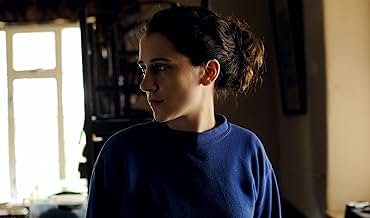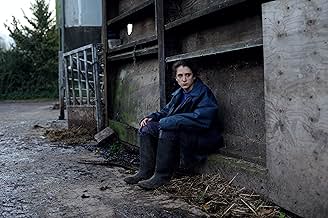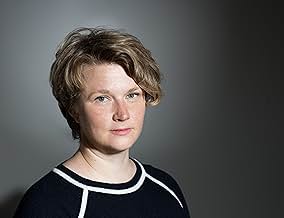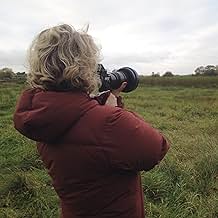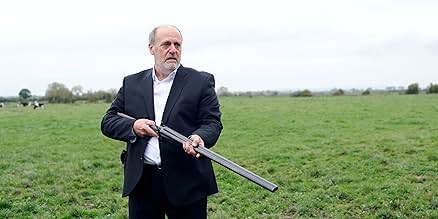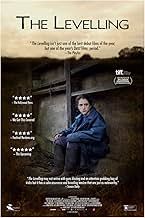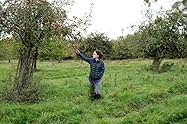IMDb RATING
6.4/10
2.9K
YOUR RATING
Trainee vet Clover Catto revisits family farm after brother's suicide. Confronts father over farm's disrepair and brother's death, uncovering family secrets and childhood revelations.Trainee vet Clover Catto revisits family farm after brother's suicide. Confronts father over farm's disrepair and brother's death, uncovering family secrets and childhood revelations.Trainee vet Clover Catto revisits family farm after brother's suicide. Confronts father over farm's disrepair and brother's death, uncovering family secrets and childhood revelations.
- Awards
- 3 wins & 6 nominations total
- Director
- Writer
- All cast & crew
- Production, box office & more at IMDbPro
Featured reviews
Clover, a veterinary student returns to the family farm following a bereavement in the family. Her father is struggling with grief over far more than this latest loss, having given up a military career to take over the farm decades earlier.
Death stalks the story as Clover's relationship with her father, mother, brother and even family dogs is explored. I almost had a feeling of in amongst the action, learning about real people through meeting them and picking up pieces of the jigsaw from each in turn. The story is so convincing that I could imagine it being filmed sequentially, with the actors learning plot twists just as we do.
Watching critically, there were perhaps two occasions when characters reacted in ways I had not expected, but I realised that they were correct and it was my anticipation that was wrong. Every revelation was something long known about but ignored or repressed. The jolt of parts falling into place was tangible; not just Clover but Aubrey and James too made discoveries about themselves and others around them.
There was minimal theatricality. Characters came and went with no introductions or explanations. Helen's character was a tiny joy, a gem of a part. The weakest character was the vicar arranging the funeral. I understand why it was necessary, but I would expect her to lead parishioners to their own conclusions, not trot out some amateur psychology. Her limited screen time would have had to be much longer to accommodate that.
Death, mud, decay, rain and stoic acceptance of tragedy run as constant themes. Images of hares play the role performed by background music in lesser films, with one swimming, then sinking lifelessly, only for the closing shot to be a hare running in the inevitable rain. No easy answers in this film, but an astonishingly brave exercise in respecting the audience to fill gaps rather than having the script explain everything.
I would be interested to know whether Hope Dickson Leach had the idea already and the real flood was a fortuitous coincidence, whether it was a hastily put together (probably largely improvised) story in response to the damage, or some other combination of theme and natural circumstance.
Death stalks the story as Clover's relationship with her father, mother, brother and even family dogs is explored. I almost had a feeling of in amongst the action, learning about real people through meeting them and picking up pieces of the jigsaw from each in turn. The story is so convincing that I could imagine it being filmed sequentially, with the actors learning plot twists just as we do.
Watching critically, there were perhaps two occasions when characters reacted in ways I had not expected, but I realised that they were correct and it was my anticipation that was wrong. Every revelation was something long known about but ignored or repressed. The jolt of parts falling into place was tangible; not just Clover but Aubrey and James too made discoveries about themselves and others around them.
There was minimal theatricality. Characters came and went with no introductions or explanations. Helen's character was a tiny joy, a gem of a part. The weakest character was the vicar arranging the funeral. I understand why it was necessary, but I would expect her to lead parishioners to their own conclusions, not trot out some amateur psychology. Her limited screen time would have had to be much longer to accommodate that.
Death, mud, decay, rain and stoic acceptance of tragedy run as constant themes. Images of hares play the role performed by background music in lesser films, with one swimming, then sinking lifelessly, only for the closing shot to be a hare running in the inevitable rain. No easy answers in this film, but an astonishingly brave exercise in respecting the audience to fill gaps rather than having the script explain everything.
I would be interested to know whether Hope Dickson Leach had the idea already and the real flood was a fortuitous coincidence, whether it was a hastily put together (probably largely improvised) story in response to the damage, or some other combination of theme and natural circumstance.
to rhondasmit "Miserable": yes, this farm appears badly run. dead mum, floods, brink of financial ruin, then suicide of heir apparent. god-awful patriarch unable to cope. daughter ran away long ago.
i don't think this film was supposed to be a study in good farm management, good animal husbandry, or exemplary familial bonds. rather - it reflects the reality of most people as flawed human beings with mostly flawed coping mechanisms. sorrow, remorse, depression, the daily grind of life's demands ('you get up and milk the cows every morning forever - this is your life') - it's a depressing movie. why would anyone want to live and work on a farm where litter is left lying about and everything is mired in muck. perhaps that's the point.
plot devices are moderately rudimentary: make the vegan veterinarian daughter kill the newborn calf "so the mother won't get attached to it" with the same gun (i think) that the brother had used to kill himself - that was just needlessly ham-handed (or beef-handed?) audience manipulation. ending pretty predictable. dad crying, daughter protagonist crying, sky crying on funeral day. acting was OK given unlikable characters. time-line too short for any character growth.
so if you want to be thoroughly depressed, watch this film. at least it's honest enough to not offer some crap Disney-esque happy-ever- after only found in fairy tales. the ending leaves a tiny sliver of hope for those so inclined. if you want unrealistic happy 'farminess" - go watch "Babe".
i don't think this film was supposed to be a study in good farm management, good animal husbandry, or exemplary familial bonds. rather - it reflects the reality of most people as flawed human beings with mostly flawed coping mechanisms. sorrow, remorse, depression, the daily grind of life's demands ('you get up and milk the cows every morning forever - this is your life') - it's a depressing movie. why would anyone want to live and work on a farm where litter is left lying about and everything is mired in muck. perhaps that's the point.
plot devices are moderately rudimentary: make the vegan veterinarian daughter kill the newborn calf "so the mother won't get attached to it" with the same gun (i think) that the brother had used to kill himself - that was just needlessly ham-handed (or beef-handed?) audience manipulation. ending pretty predictable. dad crying, daughter protagonist crying, sky crying on funeral day. acting was OK given unlikable characters. time-line too short for any character growth.
so if you want to be thoroughly depressed, watch this film. at least it's honest enough to not offer some crap Disney-esque happy-ever- after only found in fairy tales. the ending leaves a tiny sliver of hope for those so inclined. if you want unrealistic happy 'farminess" - go watch "Babe".
A young woman (Kendrick) returns to the family farm after many years, due to tragedy -- her lone brother's apparent suicide -- and grapples with a difficult situation and a combative relationship with her father.
A very British film to me: fine performances from both Kendrick and Troughton both controlled and realistically playing their parts, moody well-shot rural scenes providing some atmosphere to the bleak world: yet also one exhaustively dour, thin on plot, drama.
It's clearly sincere in the portrayal of the realities of modern farming and rural life, which may well be it's main drive alongside the similar-yet-different father\daughter relationship, but this left me cold.
A very British film to me: fine performances from both Kendrick and Troughton both controlled and realistically playing their parts, moody well-shot rural scenes providing some atmosphere to the bleak world: yet also one exhaustively dour, thin on plot, drama.
It's clearly sincere in the portrayal of the realities of modern farming and rural life, which may well be it's main drive alongside the similar-yet-different father\daughter relationship, but this left me cold.
This review of The Levelling is spoiler free
**** (4/5)
THERE ARE ONLY a handful of directors who have portrayed the true beautiful brutality of a British farmland society, a notable tick to The Witch which had a compelling story about a young witch it also had stunning cinematography - gloomy at times but thanks to this it captivated the beauty of it all. Once released it wouldn't take long for another director to follow in its footsteps.
These footsteps are followed by first-time writer-director Hope Dickson Leache, with her film The Levelling a stunningly brutal tale of a young woman who is forced to move back to her old life on a farm due to a hard loss in the family. It's hard to find an actor who can pull this off successfully, Leache found what she was looking for with Ellie Kendrick who plays her female lead, who also carries the film. Kendrick plays Clover Catto a young veterinarian trainee who is forced to live on a farm due to the loss of her younger brother, not too long after the floods of October 2014. As soon as she arrives at the place she hasn't been to in years, she feels a sense of hardship which, until her father Aubrey (David Troughton), arrives.
Dealing with him the man who told her to leave, to do what she wants at a young age, she hates him he plagues her with emotional torture and asks her to do work around the farm, this leads her to ask questions about what really happened to her brother. Aubrey calls it an accident; however, Clover isn't so sure, seemingly wanting to play detective searching for evidence around the site, putting her father's grief to the test. There's a heavy sense of guilt to him too, Clover takes this to her advantage and starts to surround him with questions - perhaps leading him to answer her.
Given Leache's direction, the film takes this all in hand captivatingly proving strength with its female lead but forgetting one initial detail - the cumulative impact. The Levelling gives us the emotional heft of dealing with death, a sense of place, and deep depression of older family members it's her father that feels the brunt of the grief, he always refers to better time and refuses to show emotion especially when Clover comes to the investigative moment that he may be involved. This is the main flaw.
A patchy flaw that's fixed by the film's nigh perfect premise, the flawless performances, the excellent screenplay and Leache's gentle, yet beautiful direction which flows. The Levelling isn't just one of the best debuts of recent years it's one of the best British films of recent years period.
VERDICT: Kendrick is fantastic in a toughly heart-warming British directorial debut, that's gently crafted by a pure modest scale of the countryside and a beautifully atmospheric tale.
**** (4/5)
THERE ARE ONLY a handful of directors who have portrayed the true beautiful brutality of a British farmland society, a notable tick to The Witch which had a compelling story about a young witch it also had stunning cinematography - gloomy at times but thanks to this it captivated the beauty of it all. Once released it wouldn't take long for another director to follow in its footsteps.
These footsteps are followed by first-time writer-director Hope Dickson Leache, with her film The Levelling a stunningly brutal tale of a young woman who is forced to move back to her old life on a farm due to a hard loss in the family. It's hard to find an actor who can pull this off successfully, Leache found what she was looking for with Ellie Kendrick who plays her female lead, who also carries the film. Kendrick plays Clover Catto a young veterinarian trainee who is forced to live on a farm due to the loss of her younger brother, not too long after the floods of October 2014. As soon as she arrives at the place she hasn't been to in years, she feels a sense of hardship which, until her father Aubrey (David Troughton), arrives.
Dealing with him the man who told her to leave, to do what she wants at a young age, she hates him he plagues her with emotional torture and asks her to do work around the farm, this leads her to ask questions about what really happened to her brother. Aubrey calls it an accident; however, Clover isn't so sure, seemingly wanting to play detective searching for evidence around the site, putting her father's grief to the test. There's a heavy sense of guilt to him too, Clover takes this to her advantage and starts to surround him with questions - perhaps leading him to answer her.
Given Leache's direction, the film takes this all in hand captivatingly proving strength with its female lead but forgetting one initial detail - the cumulative impact. The Levelling gives us the emotional heft of dealing with death, a sense of place, and deep depression of older family members it's her father that feels the brunt of the grief, he always refers to better time and refuses to show emotion especially when Clover comes to the investigative moment that he may be involved. This is the main flaw.
A patchy flaw that's fixed by the film's nigh perfect premise, the flawless performances, the excellent screenplay and Leache's gentle, yet beautiful direction which flows. The Levelling isn't just one of the best debuts of recent years it's one of the best British films of recent years period.
VERDICT: Kendrick is fantastic in a toughly heart-warming British directorial debut, that's gently crafted by a pure modest scale of the countryside and a beautifully atmospheric tale.
"The Levelling" is one such movie. Shot in a naturalistic style, it truly feels as though you're learning more about this family than you should. It doesn't star anyone recognizable, giving a sense of realism. The young veterinarian's return to her family farm opens the door to multiple revelations not only about the recent tragedies, but about things that have been going on for a long time.
Only a few movies have been this much like a knife in the stomach. another was "The War Zone", about a family that discovers an ugly secret. I recommend both movies, and I'm eager to see Hope Dickson Leach's next movie.
Only a few movies have been this much like a knife in the stomach. another was "The War Zone", about a family that discovers an ugly secret. I recommend both movies, and I'm eager to see Hope Dickson Leach's next movie.
Did you know
- TriviaOn the BBC News channel review of the year in film in 2017, critic Mark Kermode named this as his favourite British film of the year.
- GoofsWhen they are preparing to eat shepherd's pie, Aubrey says 'Do you want a drink James?' but when James refuses Aubrey says 'Oh come on Harry. Don't be such a girl.'
- Soundtracks13 Angels Standing Guard 'Round The Side of Your Bed
Performed & written by Thee Silver Mt Zion (as A Silver Mt. Zion)
Published by Rough Trade Records
Courtesy of Constellation
- How long is The Levelling?Powered by Alexa
Details
Box office
- Budget
- £1,000,000 (estimated)
- Gross US & Canada
- $3,040
- Opening weekend US & Canada
- $160
- Mar 26, 2017
- Gross worldwide
- $118,451
- Runtime1 hour 23 minutes
- Color
- Aspect ratio
- 2.35 : 1
Contribute to this page
Suggest an edit or add missing content





